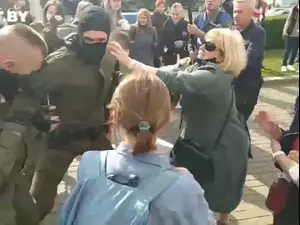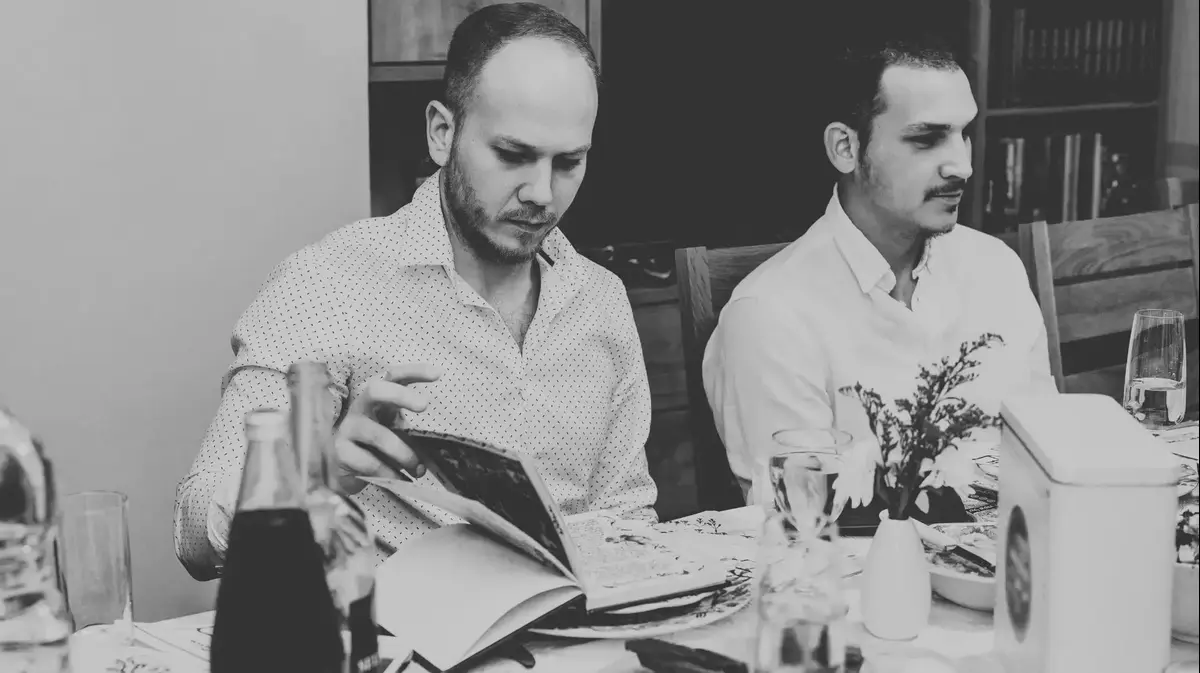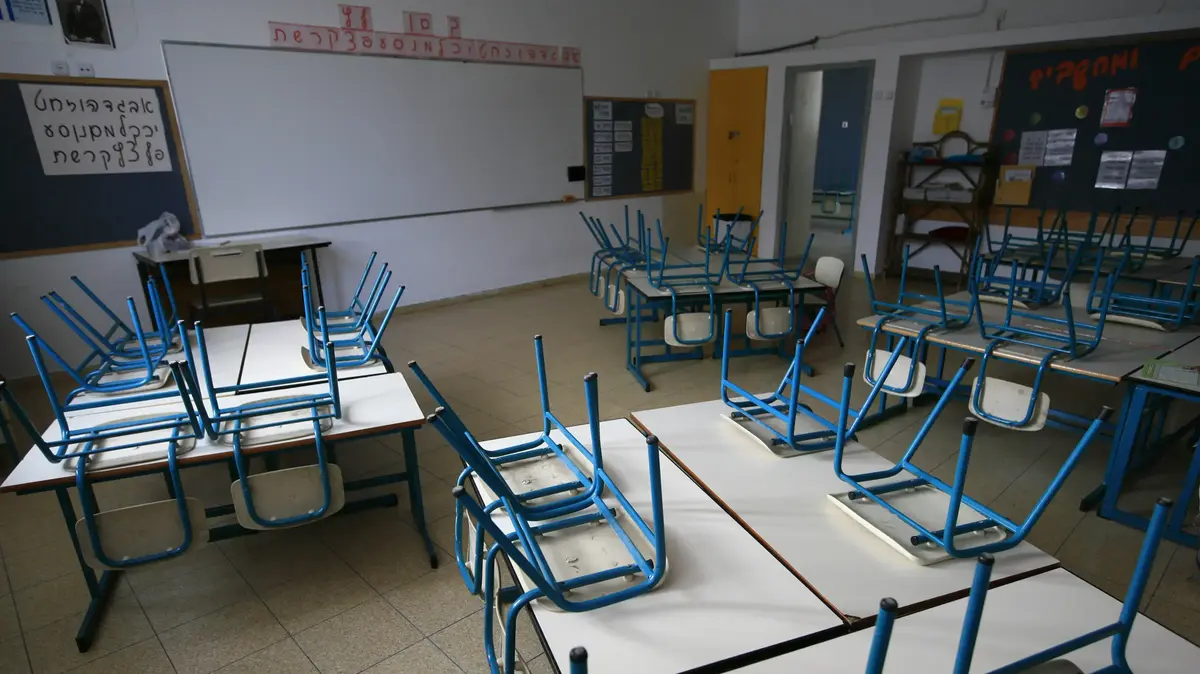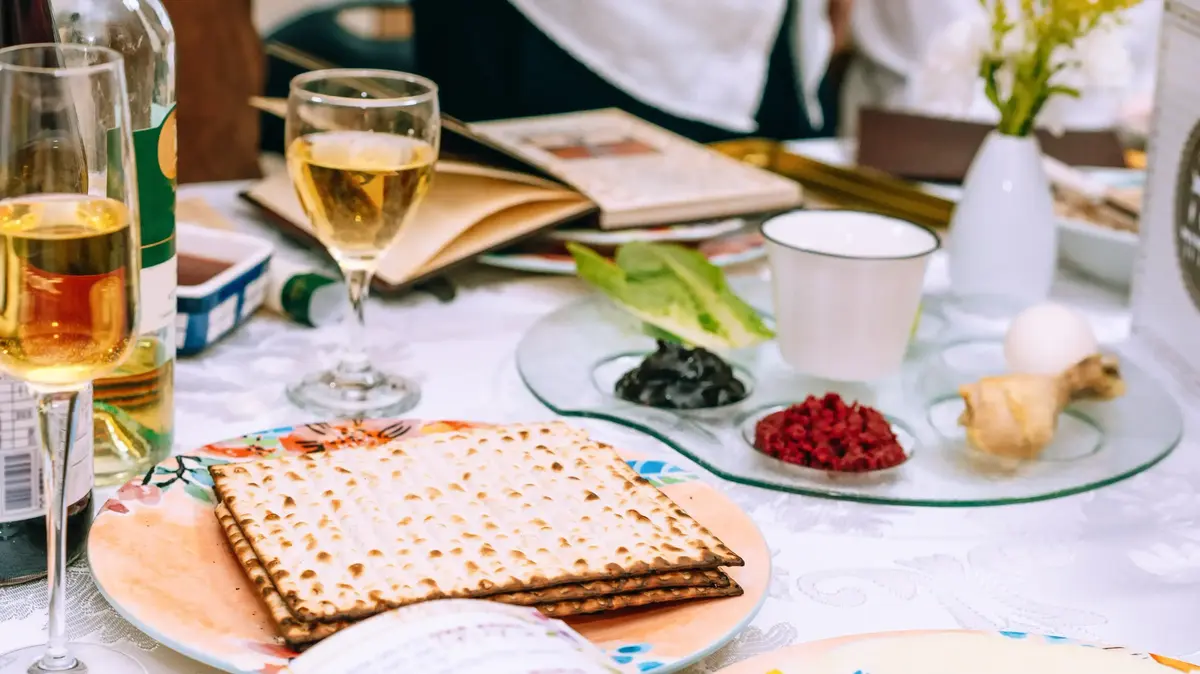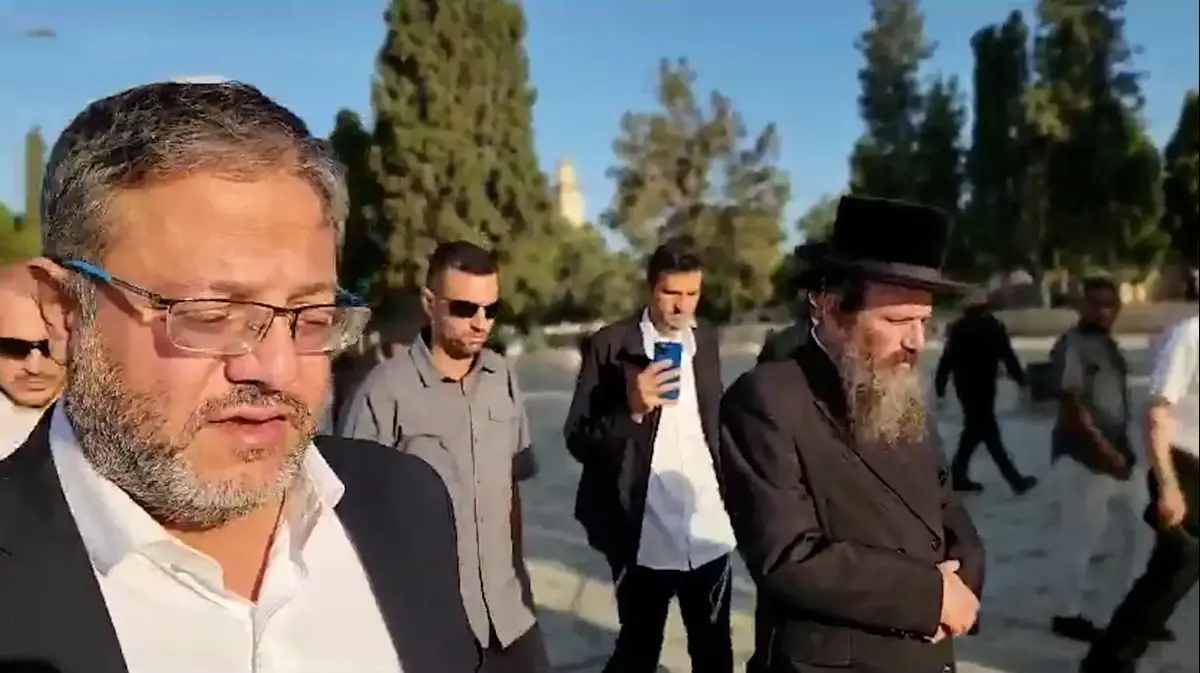news
News in Israel
Events in Israel
"There was no one like him the holiday man": the kibbutznik who was moved to tears by the Passover Haggadot
Benjamin (Buja) Yogev was born in Jerusalem during the Mandate period and settled in Kibbutz Beit HaEmek, where he devoted his life to studying and preparing secular ceremonies around the Hebrew calendar.
He also worked extensively in the kibbutz holiday archive: "was one of the pillars of Jewish renewal in Israeli society and the kibbutz movement."
Tags
Holidays
Joel Ben Nun
Dudi Zilberschlag
Eli Ashkenazi
Saturday, 19 September 2020, 11:49
Share on Facebook
Share on WhatsApp
Share on general
Share on general
Share on Twitter
Share on Email
0 comments
A month after the disaster: A fire broke out in the port of Beirut on 10.9.20
Non-anonymous: Protesters in Belarus take off masks ...
Netanyahu: I will not just impose a closure and I will not hesitate to impose restrictions if ...
Berlusconi is hospitalized after falling ill in Corona
Noa Kirl was photographed for a video with Netanyahu, contrary to the instructions ...
USA: Supreme Court Justice Bader Ginzburg dies ...
Subject: Suspicion of attempted murder in Mitzpe Ramon: A woman was stabbed in a manner ...
Harris in Florida criticizes Trump for underestimating ...
Israel signs peace agreement between the United Arab Emirates and Bahrain: ...
With checkpoints and 7,000 policemen and soldiers: the general closure ...
"The Long Day of Nirim - Dangor" - a film by Yehuda Kaveh and Dalia Gutman, Kibbutz Nirim Archive, courtesy of those photographed
Benjamin (Buja) Yogev dedicated his life to the creation of Jewish Zionist culture, and was one of the top teachers for the Israeli holidays and the history of the kibbutz holiday.
He passed away last Saturday, but it is only natural that a day later Aronw was placed in front of the synagogue he had established in his kibbutz, in Beit HaEmek.
Yogev was born in Jerusalem in January 1938. His father, a survivor of the pogroms in Ukraine, immigrated to Eretz Israel from there - while his mother immigrated with her entire family from Poland in 1935. The couple had two other children: Amitsur and Etty.
The Jerusalem of his childhood, he recounted, was "the little Jerusalem between Ben Yehuda-Jaffa-King George streets. The Old City was light years away, across the border."
He studied at the Rehavia Gymnasium in Jerusalem, when among his educators there were falls of government: the history teacher was Professor Zvi Yavetz, the literature teacher was the poet Yitzhak Shalev and the grammar teacher was Professor Uzi Ornan the linguist.
Read more on the subject
"Physician in his mind and essence": The cardiologist from the Galilee who won the hearts of his patients
The man with the golden hands who became one of the pioneers of flying in Israel: "He was not even old for a day"
"Bridge between Communities": The rabbi from Beit She'an who called for unity and worked to heal the rifts in society
Every day, about 50 Israelis have a heart attack: the medical service that will save your life
"He was the man of 'and you rejoiced in your feast and you were but happy.'"
Benjamin Buja Yogev (Photo: Shitim Institute)
The important and formative event of his childhood was the night of the decision to divide the Land of Israel, November 29, 1947: joy, dance and understanding that the Jewish people have a state of their own. Immediately the next day he began to experience as a child the difficult period of Jerusalem: his father was drafted into the army. whole was under siege, surrounded by gunfire, little food and water shortages.
in the coming years, after the establishment of the State of Israel and the young, devoted Yogev movement of our youth - tribe on the part of the Boy Scouts, led by instructor AB Yehoshua. operations, training, summer camps and camps The work led Boja to a decision to join the fulfillment of the kibbutz. Thus, he did his military service as a fighter in the parachuted Nahal and during the route he came with his nucleus to Kibbutz Beit HaEmek in the Western Galilee.
More on Walla!
NEWS
"The burden of generations has been placed on me": the boy who escaped the riots of 1905 and became the defender of the city of Safed
To the full article
Already in the first years of the kibbutz, he began initiating Shabbat receptions, holiday ceremonies and building the community around the Jewish year circle.
Later, he initiated the establishment of a synagogue in his kibbutz.
The synagogue, designed by the architect and member of Beit HaEmek, Freddie Kahana, was built around an ark that accidentally found a kibbutz member who got stuck in a remote town in Germany during a trip on a motorcycle.
In the same town, there was a training farm of a Zionist youth movement in the 1920s, and after it stopped operating, the ark was dismantled and kept in an attic, until it was discovered by chance after about 40 years and made aliyah to a secular kibbutz in Israel.
The synagogue has become a central meeting place in the kibbutz.
It operated as a secular synagogue, with no separation between women and men.
Every Friday, Saturday and holiday, prayers were held there, and in addition, joint bar mitzvah ceremonies, celebrations and holidays were held.
"Any preoccupation with 'religious and secular' questions would have become ridiculous next to this man."
Yogev (Photo: Shitim Institute)
Yogev built his life on the kibbutz.
He coordinated the issue of culture and holidays in Beit HaEmek for several periods, and even served as the kibbutz's secretary.
He also worked for many years in the kibbutz's agricultural and services industries.
In the deep house he also married Daniela and the two had three sons and a daughter, who gave birth to ten grandchildren.
The family twice went on missions abroad, in which it continued its rise in youth movements: in the mid-1960s to England, as part of the Habonim movement in England and in the late 1970s to the United States, this time as part of the "Young Judah" movement. In this role, he initiated the establishment of the Oded nucleus - a year of service for the movement's graduates in development towns.
Among his many areas of activity, Yogev repeatedly engaged in kibbutz frameworks in Jewish culture. In the kibbutz movement he coordinated the Department of Israeli Sources in Oranim in 1988-1985. , And coordinated the movement's holiday committee from 1992-1988.
"If they measured his mental heat, he was always hot to hot"
However, his main life's work was at the Shitim Institute - the Kibbutz Holiday Archive, an institute that works to create and shape a Jewish-Zionist-humanist identity and culture, through specialization in Israeli holidays and times of life.
After the death of Aryeh Ben-Gurion, the institute's founder, Yogev took over the leadership of the institution.
"Buja inherited a generation of elephants," says Eran Yarkoni, director of the Shitim Institute today.
"They were great and serious scholars, while Boja was characterized by the knowledge of passion, animals and the joy of the holiday."
"He went everywhere he was invited - settlements, youth movements, preparatory schools, military bases. Many were swept away by his passion and followed him, from twenty to eighty years old, from all parts of Israeli society. What guided him all the time was love of Israel," said Yarkoni.
"His devotion was not only to the transmission of the heritage, but to an adherence to the love of the state and an adherence to the values of a just, egalitarian society that strives for peace."
The energy that motivated Buja was the desire to build a Jewish-pioneering society around Israeli culture, the Jewish year cycle and the human life cycle, centered on the fulfillment of the vision of the prophets: an exemplary society of equality and solidarity.
His many friends and students pointed to his deep connection to the issue of Jewish renewal, and to his enthusiasm for dealing with it.
"It emerges from the Haggadahs that love has no end for the Jewish people."
Yogev (Photo: Shitim Institute)
Muki Tzur, Yogev's friend for decades, since his childhood in the gymnasium in Rehavia, described him as "a revolutionary close to the Jewish and pioneering roots, who migrated from place to place to preach an unmistakable message." "... He always learns, always shares his knowledge with the many. If his warmth was measured, he was always hot to hot."
Uri Heitner, a student and friend, wrote in an obituary that he read at Yogev's funeral that "Buja is one of the pillars of Jewish renewal in Israeli society in general and in the kibbutz movement in particular. His place in the world of Israeli Jewry is a unique place. Deepening the content of the holidays, he was the man of the joy of the holidays, of 'and you rejoiced in your holiday and you were only happy' ".
"Buja, until the end of his life, was a constant eruption of life, of joy of life, of kindness, of optimism, of vigor, of doing, of curiosity, of learning, of desire to teach, to educate, to instill his teachings. "The love of man, the people, the land, the kibbutz, the holidays of Israel, the holidays of the kibbutz," Heitner added.
However, he wrote that along with the devotion and joy that characterized him, "he was also very worried and very troubled by severe phenomena in Israeli society and the kibbutz movement, which he took very seriously. And the worry and sorrow were permanently beside the joy."
"An incessant volcanic eruption of life."
Yogev (Photo: Shitim Institute)
Yogev has also forged warm relationships with figures from other Jewish streams.
The ultra-Orthodox media man, Dudi Zilberschlag, was also a close friend of his.
In his obituary, Zilberschlag called him "my friend as my brother."
"We read differently in the sources, we shared opposing opinions, we argued bitterly, we were often divided from end to end. But mutual respect always dominated the discourse," Zilberschlag said.
Another friend, Rabbi Yoel Ben-Nun, wrote that "any preoccupation with 'religious and secular' questions would have become ridiculous next to this man, who was so religious and free and secular together, without any tension, without confrontation and without disagreement - many times we taught together a lesson on "Passover and the Feast of Unleavened Bread or the holidays of Tishrei, Hanukkah and Independence and more, and the lesson flowed naturally and ended with sweeping singing that Buja initiated."
According to him, "with Buja always celebrated natural unity and joy."
"Died prematurely - and in good return"
In his work at the Shitim Institute, he co-edited and published four books.
The main one is the book "You are moving to a new land - the Passover Haggadot in the kibbutz".
This is a factory of 25 years of collecting and collecting documentation materials from dozens of kibbutzim that have been compiled into a book that reviews the history of the kibbutz Haggadah for Passover between the 1930s and 1950s.
It was a Jewish-kibbutz-cultural enterprise in which Abba Kovner began and in which Buja was a partner with other scholars and intellectuals from the kibbutz movement.
For decades, Pesach was the main holiday in every kibbutz and even became the most important evening of the year.
When the book was published, Yogev said in an interview that "the matter of redemption was at the center. As if to say: 'Not only were our ancestors redeemed, we were also redeemed'. They saw themselves as contemporary Egyptians preparing the homeland for the masses of Beit Yisrael. Fascinating documents that express this more than the kibbutz haggadot. "
"With Buja always celebrated natural unity and joy."
Yogev (Photo: Shitim Institute)
But the Haggadahs not only fascinated Yogev - they moved him.
He said at the time that when he went through the hundreds of Haggadahs, he was "moved to tears to see the love of the land, agriculture, work and the Jewish people. They write in those Haggadahs that everything is done for the Jews in the Diaspora. The texts show endless love for the Jewish people."
For his educational work over the years, he received a certificate of appreciation for a unique contribution to Israeli society, from the "Community Centers" and the organization "Together". He was also awarded a certificate of appreciation, for his contribution to Israeli society, the organization "Tmura - Israeli Jewry" and the International Institute of Judaism Secular humanist.
Last Saturday he passed away at the age of 82. "Buja died prematurely in good return," Heitner praised him. "Usually, such a sentence is an oxymoron: either a person dies prematurely or he dies in good return.
But anyone who has known Buja knows that even though he crossed the heroes and died in the ninth decade of his life - this man was preceded in death by his death, and the service of his life in the middle ceased;
And narrow!
He had one more psalm - and behold, the psalm was lost forever, lost forever! "
Share on Facebook
Share on WhatsApp
Share on general
Share on general
Share on Twitter
Share on Email
0 comments

